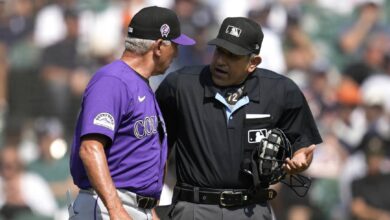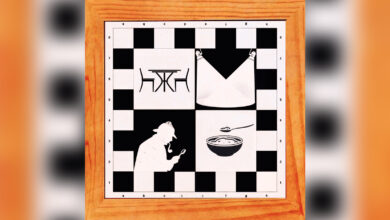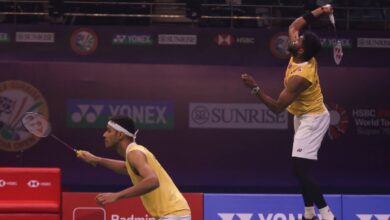Asian Games, equestrian: How camaraderie with his horse and readiness to leave home brought Anush Agarwalla his second medal in three days | Asian-games News

One has an elegant walk, an expressive trot and an easy canter. The other is creative, compassionate and supple.One, a horse of great pedigree. The other, a rookie rider with a family hory in the business of warehousing.
Bay stallion Etro and Anush Agarwalla met at an Olympic champion’s barn a year ago. Since then, they’ve been inseparable. “They have a connection,” declares Doris Schmidt, the wife of former Olympic champion Hubertus, who trains Anush.
The German horse and the Indian rider scripted more hory in China on Thursday. Two days after Agarwalla, astride Etro, won the team dressage gold medal at the Donglu Equestrian Park, the 23-year-old galloped to an individual bronze to mark another first for Indian equestrian at the Asian Games.
“It feels unreal,” Agarwalla says. “I knew I had a good partnership with my horse. Today, my horse was amazing.”
Agarwalla and Etro showed immaculate grace and harmony to deliver an impressive test and posted 73.030%, a culmination of scores across a series of movements that are marked out of 10.
Agarwalla was judged on the coordination with his horse and harmony, the two aspects he spectacularly failed at six years ago.
When he left the comforts of his home in Kolkata and moved to a sparsely-populated municipality in Germany, Borchen, to become an elite rider, Agarwalla couldn’t even get on the back of a horse properly.
Hangzhou: Indias Anush Agarwalla (Etro) stands at the podium after winning the bronze medal in the Equestrian Dressage Individual Final event at the 19th Asian Games, in Hangzhou, China, Thursday, Sept. 28, 2023. (PTI)
“He was bouncing a bit and that isn’t good either for the rider or for the horse’s back,” Doris, who trails Agarwalla along with Athens Olympics gold medall Hubertus, says.
The Schmidts have been running a renowned riding school in a remote corner of Borchen for decades. Agarwalla hadn’t seen anything like that before.
He was introduced to riding his parents at the age of 3, when they took him to the Tollygunge Riding Club every Sunday. “He developed an immediate interest,” says Anush’s mother Priti. “ the time he was 10, Anush was travelling to Delhi every weekend.”
That’s the first time he moved his base – to Delhi. Agarwalla, who was riding only ponies, soon realised he needed better coaches, horses, shows and infrastructure to raise his level. And that wasn’t going to happen staying put in India.
He contacted Schmidt, after being rejected many trainers, and the German invited him for trials. “He was 17 at the time and since then, he’s been based in Germany,” Priti says.
Moving to Borchen turned out to be a life-altering decision for Agarwalla. Back then, it didn’t feel like that. “It’s not a common thing to do,” Priti says. “(But) The most important decision was to take our son out of school when he was in Class 12 and send him abroad.”
Out of his comfort zone
Fleyenhof, the facility Schmidt owns, is located in an area so remote that when the Agarwallas first went there, they couldn’t even find it. The decades-old farm is cosy and comfortable, and home to champion riders.
Hangzhou: Indias Anush Agarwalla with his horse Etro being congratulated his team after winning the bronze medal in the Equestrian Dressage Individual Final event at the 19th Asian Games, in Hangzhou, China, Thursday, Sept. 28, 2023. (PTI Photo/Gurinder Osan) (PTI09_28_2023_000202A)
But the lifestyle was more mundane than glamorous.
“It sounds fancy that you are living in Europe but it’s a village,” Priti says. “The total population would be like a thousand people and he has to do everything alone.”
Agarwalla now speaks fluent German and is completing a degree in business adminration. But when he landed in Germany, he lived in a tiny room at the stable, where he cooked, slept, studied and took care of the horses. Occasionally, he had to fly back home to appear in exams to complete his open schooling.
“It was a huge struggle but he was determined to carry on. But it was definitely not easy,” Priti says.
The struggle wasn’t limited to adopting a new lifestyle. After riding ponies for years, Agarwalla wasn’t even able to get on a horse.
“So we trained him to sit a bit heavier in the seat and to get more involved in the European style of riding,” Doris says, referring to a style that demands more control and the horse is ridden in a shorter, upright frame. “I taught him to not bounce, keep the legs long, whip (the horse) in the hip and to follow the steps of the horse.”
During his early years, Agarwalla – ‘a quick learner’ – rode different horses and struggled on a few of them. Then, he decided to purchase Etro, who is a ‘really good mover’ and ‘fit him perfectly because he isn’t tall’, Doris adds.Most Read
1
Watch this Space: Chandrayaan-3 sleeps as US Space Force punches a hole in atmosphere
2
IAS officer, transferred over stadium row, now compulsorily retired Govt
See More
“The father of this horse competed up to the Grand Prix level and also international shows. He was in the German team too,” Doris says about the horse’s pedigree. “We know the father and know this horse as well. They are good in the head, not spooky or running around; they have good movement and character, which is what you need for dressage.”
Doris and Agarwalla both talk about their horses just like they would talk about a human partner. The fate, after all, of the rider and the horse are intertwined. They both have to exhibit a series of predetermined movements, like in gymnastics. The horse has to walk, trot, gallop and canter to the music that plays in the background. And the rider has to ensure obedience, precision and camaraderie.
No wonder that after he collected his second medal in three days, Agarwalla credited his horse while reflecting on his journey. “My horse was amazing. This is what I have always wanted and visualised,” he says. “It’s not come overnight. It’s been a long, long journey and a lot of times, I thought I was not good enough. But holding this medal today, it’s all worth it.”






